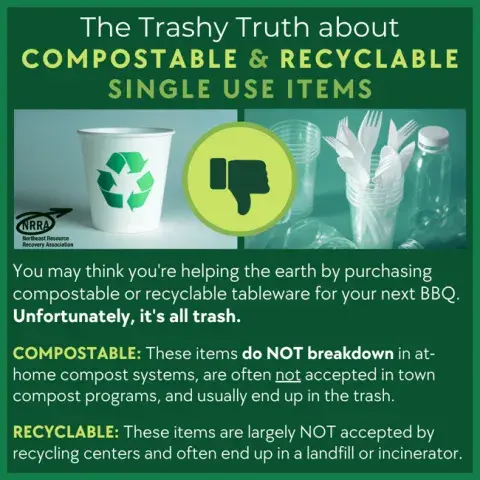
THE ANSWER? BOTH ARE TRASH.
The question: Which is better, compostable or recyclable single use items?
We know this is a tough one, but it's true - neither compostable nor recyclable single use tableware (like paper cups or compostable cutlery) are great for the environment. Your best bet is to go with reusable tableware and cutlery for your next shindig. Here's why:
"COMPOSTABLE" ITEMS...
- Do NOT break down in at-home compost systems. If you toss one in, it will remain intact for many years to come.
- Are also generally NOT accepted in many municipal or residential composting programs.
- This means that the vast majority of items sold as "compostable" instead end up in a landfill or incinerator.
"RECYCLABLE" ITEMS...
- Though they may be marked #1, that's just an indication of the type of plastic the items are made of. The VAST MAJORITY of "recyclable" cups, plates, and cutlery are NOT accepted by recycling programs or at transfer stations.
- Paper goods used for food or drink have a thin plastic layer to keep them watertight and insulated. This plastic layer means these are not recyclable, either.
- This means that nearly all "recyclable" single-use items like cups, plates, and cutlery end up in the landfill or incinerator and are NOT recycled.
Landfills are not designed to break down waste, only to store it. Garbage (including compostable items) in a landfill decompose VERY slowly in a tightly-packed, oxygen-free environment. Because of the lack of oxygen, bacteria in the waste produce methane gas, which is highly flammable and dangerous if allowed to collect underground. It is also a potent greenhouse gas and contributes to global warming.
This material is based upon work supported under a grant by the Rural Utilities Service, United States Department of Agriculture. Any opinions, findings, and conclusions or recommendations expressed in this material are solely the responsibility of the authors and do not necessarily represent the official views of the Rural Utilities Service. Rural Community Assistance Partnership, Inc., is an equal opportunity provider and employer.
